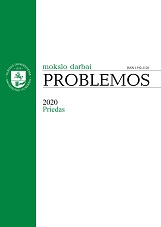Kokia yra Immanuelio Kanto žmogaus kaip paskutinio gamtos tikslo sampratos prasmė?
What is the Meaning of Immanuel Kant’s Notion of the Human Being as the Ultimate End of Nature?
Author(s): Danutė BacevičiūtėSubject(s): Ethics / Practical Philosophy, Early Modern Philosophy, Environmental interactions
Published by: Vilniaus Universiteto Leidykla
Keywords: Kant; authentic ethical interpretation of nature; ultimate end of nature; vulnerability;
Summary/Abstract: The article explores Kant’s notion of the human being as the ultimate end of nature, presenting an ethical interpretation of this notion. The author of this article believes that the analysis of Kant’s assumptions will allow a deeper understanding of our own hermeneutical situation, in which ecological problems force us to rethink our relationship with nature and the meaning of human existence. Analyzing Kant’s early texts on Lisbon earthquake and his reflection on the sublime in the Critique of Judgement, the author asks how the experience of an uncontrolled natural element complements Kant’s ethical vision of nature’s teleology. Emphasizing the importance of insight into human vulnerability for the implementation of moral purpose in nature, the article outlines guidelines for interpretation that allow the relevance of Kant’s position in the context of contemporary environmental ethics.
Journal: Problemos
- Issue Year: 2020
- Issue No: Suppl.
- Page Range: 19-30
- Page Count: 12
- Language: Lithuanian

